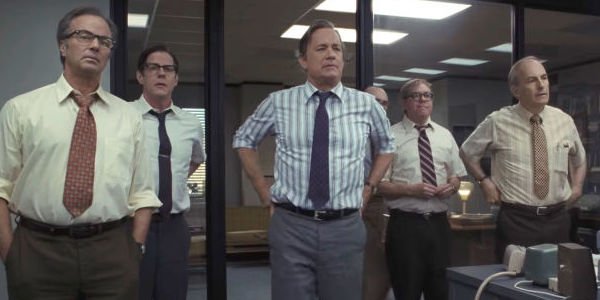What The Term ‘Fake News’ Means To The Cast Of Steven Spielberg's The Post

Your Daily Blend of Entertainment News
You are now subscribed
Your newsletter sign-up was successful
"Fake news." It is a hand-grenade of a term, a phrase adopted everywhere from politics to entertainment in 2017 to largely represent published stories that spread information one or more parties disagreed with. Someone prints a fact that makes you look bad? Call it "fake news," and move on with your day. The topic rears its head in Movie Land as 2018 gets underway, because Steven Spielberg's brilliant Oscar contender The Post will be reaching more theaters as this month progresses. And the movie reflects on the hard work done by journalists to publish facts, even as a Nixon administration is trying to block newspapers from running stories he doesn't find favorable. So when we sat down with the cast of The Post in New York City, I asked them what the term "fake news" meant to them, and was told by Carrie Coon and Sarah Paulson:
Carrie Coon: I don't believe in alternative facts. I feel the word 'fact' has a definition.Sarah Paulson: It's an unshakable thing.Coon: It's important to agree on facts, so you can have an argument about the best course of action. But we seem to have gotten away from that a little bit.Paulson: If you have a starting point of, 'We know this is irrevocably a fact, this is true'... but when you start diluting that and -- not only diluting it, but basically shaming it out of existence, then anybody who wants to subscribe to any way of thinking... You don't know where the middle ground is. So you can't form an opinion because you're actually forming an opinion about an untruth. Around an untruth.Coon: 'Fake news' is a lie. That's what it is. It's not news. It's a lie.
The reason this is relevant to the cast and crew of Steven Spielberg's The Post is because the timely and spectacular drama focuses on the dogged efforts to publish hard truths about our own government and our nation's involvement in the Vietnam conflict, even though publishing these facts made the Nixon White House (and the administrations that came before him) look like liars. Ben Bradlee (Tom Hanks) and his team of reporters at The Washington Post got their hands on The Pentagon Papers, research work ordered by Robert McNamara (Bruce Greenwood) on the ongoing war effort. The Post scrambled to publish as Nixon was pushing an injunction against The New York Times for running similar articles. Nixon might have called the Pentagon Papers "Fake news." The Post covers a crucial standoff between a U.S. President and a free press, one that went all the way to the Supreme Court.
I won't tell you how it's all resolved. For that, you can see The Post. Or pick up a history book. But you can see Carrie Coon and Sarah Paulson talking about their new movie, and the idea of "Fake news," with CinemaBlend:
The Post is, in my humble opinion, one of 2017's best movies. Steven Spielberg delivers a freight-trail of an historical drama that's led by one of his strongest ensembles, including Tom Hanks, Meryl Streep, Bob Odenkirk, David Cross, Tracy Letts, Bradley Whitford, Carrie Coon, Sarah Paulson, Matthew Rhys and Bruce Greenwood. It's in select theaters as we speak, but will open wide on January 12. Get your tickets to this one now.
Your Daily Blend of Entertainment News

Sean O’Connell is a journalist and CinemaBlend’s Managing Editor. Having been with the site since 2011, Sean interviewed myriad directors, actors and producers, and created ReelBlend, which he proudly cohosts with Jake Hamilton and Kevin McCarthy. And he's the author of RELEASE THE SNYDER CUT, the Spider-Man history book WITH GREAT POWER, and an upcoming book about Bruce Willis.
